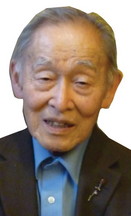Quentin Chihiro IkezoeDeceased: October 8, 2012
Service Information:Visitation: Sunday, October 14, 2012 12noon until funeral service at 3pm
|
 |
Obituary
Ikezoe,
Quentin Chihiro Ikezoe, 90 years,
Beloved husband of the late Betty.
Loving father of
Jean (Charles) Halevi, Warren (Lori Matsumura) Ikezoe,
Jay (Azra) Ikezoe and Wes (Cindy Dumlao) Ikezoe.
Super grandfather of Ethan and Ariella Halevi,
Alia and Kyle Ikezoe and Camila Marquez.
Younger brother of Mitz (late Aster) Ikezoe .
Brother in law of
Ruth (late Ronald) Minami, George (late Flo) Kawamoto
and Clara (late Ralph) Yakushi.
Fond uncle of many nieces and nephews.
U.S. Army veteran of WW II and Korea.
U.S Postal employee for many years.
Despite adversity in his life, Chic was alway good natured and
had a positive outlook and loved to laugh.
Visitation Oct. 14th Sunday from noon until funeral service
at 3:00 pm at Lakeview Funeral Home 1458 W Belmont Ave. Chicago, Il 60657
for info 773-472-6300 or www.lakeviewfuneralhome.com
Messages
-
Dad
By Jean Ikezoe-Halevi
My Dad was a great man. He overcame many circumstances in life that would have crushed others and made them bitter, but he always found the positive side.
Quentin Chihiro Ikezoe was born on May 2, 1922 in San Jose, California to Tomitaro and Suye Ikezoe, who were immigrants from Japan. Tomitaro was a sharecropper on the vast Winchester farmland, which was owned by the widow of the heir to the Winchester rifle fortune. Chic and his older brother Mits were born on the property in a house built by their father. The site where their house stood is now part of Interstate 280.
When Chic was 1 ½ years old, his mother died while pregnant. At age six, Chic's father contracted tuberculosis. Consequently, Tomitaro could no longer care for his sons and took them to San Francisco to live in the Japanese Children's Home, an orphanage run by the Salvation Army.
Despite this, Chic was a happy-go-lucky child and the gang leader of several boys at the orphanage during the Great Depression. Chic and his gang stole rides on cable cars by hanging on to the cow catcher in the front so the conductor wouldn't see them. He told the other boys “to hold on tight” so they wouldn't fall off. Other antics included getting newspapers to sell, then pocketing the money and running off.
One day he was reaching out the window of the second story bedroom he shared with several boys and fell. He crashed through the skylight of the infirmary below and barely missed the sink, hitting his arm on it. The infirmary was empty and no one saw him walk out. It become a mystery as to how the skylight was broken.
On May 27, 1937, Chic and his friends walked across the Golden Gate Bridge on opening day. It was a grand celebration. He took a small wooden stake form near the bridge and hid it with other mementos in a secret place in the orphanage. It may still be there today.
When Chic was a young teenager, he met a new girl at the orphanage. Her name was Betty Niguma, and she would turn his life around. Betty was smart so Chic studied harder and finished high school.
After the Japanese bombed Pearl Harbor on December 7, 1941, Chic was one of 120,000 Japanese Americans who were taken from the West Coast and sent to internment camps behind barbed wire with armed guards in some of the remotest places. He was 19 and sent to Heart Mountain, Wyoming. Betty and her three younger sisters were sent to Manzanar in Death Valley, California; she and Chic wrote to each other during the war.
Chic volunteered for the army, but was rejected for poor eyesight. After about a year in the internment camp he would leave if he had a job, but Japanese Americans could not return to California. He saw an ad posted for a job in downtown Chicago as a dishwasher at the Sherman Hotel. He decided to go to Chicago because he listened to the WLS on the radio and the announcer would say, “It's a beautiful day in Chicago.”
Coming to Chicago, he had a series of menial jobs, including one at the Oscar Mayer meat packing plant. There were many different people working there, including Americans of Chinese, Japanese and Filipino heritage. The Military was a huge customer for Oscar Mayer, and one day an officer saw “Orientals” working there and complained. He wanted them all fired and the company complied. News of this reached the Quakers who came and tried to get the men rehired, but to no avail.
Soon after, at the end of WWII, Chic was drafted into the army. He was sent to Hawaii, where he worked in communications with the 972nd Signal Service Battalion. He liked reading the news sent from across the country, especially the baseball scores. Chic enjoyed Hawaii, but once, while swimming he was stung by a Portuguese man o' war. While in the service, Betty wrote to him each day; he received more than 700 letters.
After the war he went back to Chicago and wanted to get a good job so he could marry Betty. Luckily, civil service tests were being given for U.S. Post Office jobs and he passed.
Chic and Betty got married in Chicago on July 1, 1950, just days after the Korean War started. Call up again, he was sent to Georgia as a staff sergeant and Betty went with him. Although they'd experienced prejudice in California, they were not prepared for racial segregation. They didn't care for the South because of the way blacks were treated.
Soon Chic and his unit were scheduled to be sent to Korea. Days before they were to leave, a snafu in the paperwork was discovered. Instead of going to fight in Korea, they were all honorably discharged.
Returning to Chicago after the war, Chic worked at the Post Office. He and Betty had four children: Jean, Warren, Jay and Wes. They were happy in Chicago.
Chic finished two years of junior college on the G.I. Bill at Wright Junior College and another year at Northeastern Illinois University. All four of his children went to Northeastern, too.
In order to support his children, Chic took a second full time job at St. Joseph Hospital. He worked very hard to give his family a good life.
While at the orphanage, Chic and Betty played together in a musical group. Chic played guitar and Betty played the violin. When they went to the internment camps, each person could only take two suitcases. Chic opted for taking his Gibson guitar instead of a second suitcase; he had to sell a banjo because he couldn't carry it. Betty opted to take her violin.
At home Chic played his guitar and often sang cowboy songs, such as “Red River Valley.” “You Are My Sunshine,” was another favorite. He also enjoyed playing a Hohner harmonica and was very good at it.
Betty had a stroke in 2002. Chic became her caregiver until her death in 2006. They were married nearly 56 years and were the couple that still held hands when they walked outside. He missed her terribly.
When talking about his life, chic said going to the orphanage wasn't a bad thing because there he met Betty. Out of the fifty children, he and Betty were the only two who fell in love and married another from the Children's Home.
Regarding being in an interment camp, Chic said the war gave him new opportunities that wouldn't have been possible before due to racial prejudice. He told that story to author Studs Terkel a few years ago, during a lengthy interview for a book he was writing. Chic and Terkel got along very well and had a beer together in Terkel's north side home. Although his story didn't make the final cut for Hopes Dies Last: Keeping the Faith In Troubled Time, Chic's name is mentioned in the acknowledgments, slightly misspelled.
Dad was a good person who treated everyone with respect. He had a great sense of humor and loved to joke around.
One of the most telling signs of a person's character is how they are treated by other. When Mom was a patient at St. Joseph's Hospital after Dad retired, I went with him. As we walked through the hospital, he saw a staff member who knew him. Instead of a brief “hello,” the staff member stopped, shook hands with Dad and talked for several minutes. I stepped aside while they talked.
We started walking and another staff member came up to Dad and did the same thing. This happened two more time and could tell by their body language that people cared about Dad and wanted to talk with him. It took nearly and hour to get to Mom's room. You don't often see how your parents are treated by their peers and I don't think I've ever been prouder of my father than that day.
When we lost our mother, I learned more about her from my father and saw a whole new dimension to her. If my father had died first I wouldn't have known him half as well as I do now.
Dad died on Monday, October 8, 2012. I believe he's with my mother now, holding hands forever. - October 13, 2012
-
Dear Jay,
I am very sorry for the loss of your father and extend my condolences to your entire family. I hope and trust you will find peace and comfort in the memory of the special, unique gifts your father gave all of you, knowing that he is present in the lives of those who carry on in this life.
Best wishes,
Gerald
